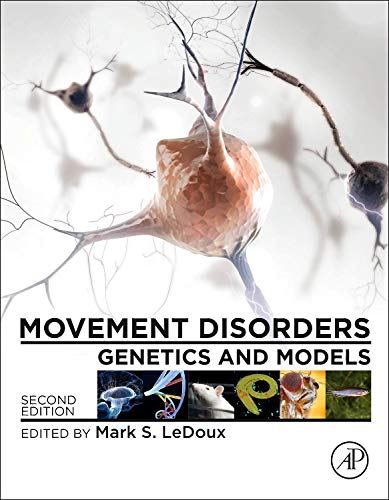Items related to Movement Disorders: Genetics and Models

Synopsis
The use of animal models is a key aspect of scientific research in numerous fields of medicine. Movement Disorders, Second Edition vigorously examines the important contributions and application of animal models to the understanding of human movement disorders, and serves as an essential resource for basic neuroscientists engaged in movement disorders research. Academic clinicians, translational researchers and basic scientists are brought together to connect experimental findings made in different animal models to the clinical features, pathophysiology and treatment of human movement disorders.
The book is divided into sections on Parkinson's disease, Huntington's disease, dystonia, tremor, paroxysmal movement disorders, ataxia, myoclonus, restless legs syndrome, drug-induced movement disorders, multiple system atrophy, progressive supranuclear palsy/corticobasal degeneration, and spasticity. This book serves as an essential resource for both clinicians interested in the science being generated with animal models and basic scientists studying the pathogenesis of particular movement disorders.
- Introduces the scientific foundations for modern movement disorders research
- Contributing authors are internationally known experts
- Completely revised with 20% new material
- Provides a comprehensive discussion of genetics for each type of movement disorder
- Covers Parkinson's disease, Huntington's disease, dystonia, tremors, and tics
"synopsis" may belong to another edition of this title.
From the Back Cover
This volume will cover the entire spectrum of movement disorders with a heavy focus on models driven by neurogenetics. The field of movement disorders has grown exponentially in the past decade and is now a multidisciplinary science involving neuroscience, genetics, pharmacology and animal model research. Marked advances have occurred in the genetics of movement disorders and this has driven the development of many new animal, computational and cellular models. The explosion of new genes and associated animal models is overwhelming. This book serves as the only single source available for accessing integrated and organized current information in the field. It is an essential reference for clinicians, clinician-scientists and bench scientists interested in the study of movement disorders.
About the Author
Mark S. LeDoux, MD, PhD is a physician-scientist at the University of Tennessee Health Science Center. At present he holds a joint appointment as Professor in the Departments of Neurology, and Anatomy and Neurobiology. He specializes in the neurological subspecialty of movement disorders and treats patients at the University of Tennessee Medical Group and Memphis VA hospital. As an active clinical researcher, Dr. LeDoux’s work has focused on the genetics and treatment of dystonia, Parkinson disease and Huntington disease. He has described Huntington disease in a nonagenarian and reported one of the world’s largest pedigrees with HDL2. In the laboratory, Dr. LeDoux has published extensively on the genetics and molecular biology of dystonia, mechanisms of cell death in Parkinson’s disease, animal models of dystonia and autism, and the neuroanatomy of motor systems. His work with the dt rat engendered paradigm shifts in dystonia and motor systems research. Dr. LeDoux’s lab showed that familial and sporadic adult-onset primary dystonia may be associated with rare sequence variants in THAP1 and CIZ1.
"About this title" may belong to another edition of this title.
- PublisherAcademic Press
- Publication date2014
- ISBN 10 0124051952
- ISBN 13 9780124051959
- BindingHardcover
- LanguageEnglish
- Edition number2
- Number of pages1258
- EditorLeDoux Mark S.
(No Available Copies)
Search Books: Create a WantCan't find the book you're looking for? We'll keep searching for you. If one of our booksellers adds it to AbeBooks, we'll let you know!
Create a Want